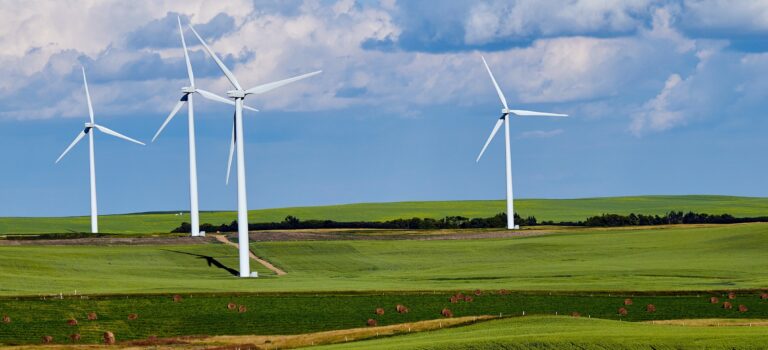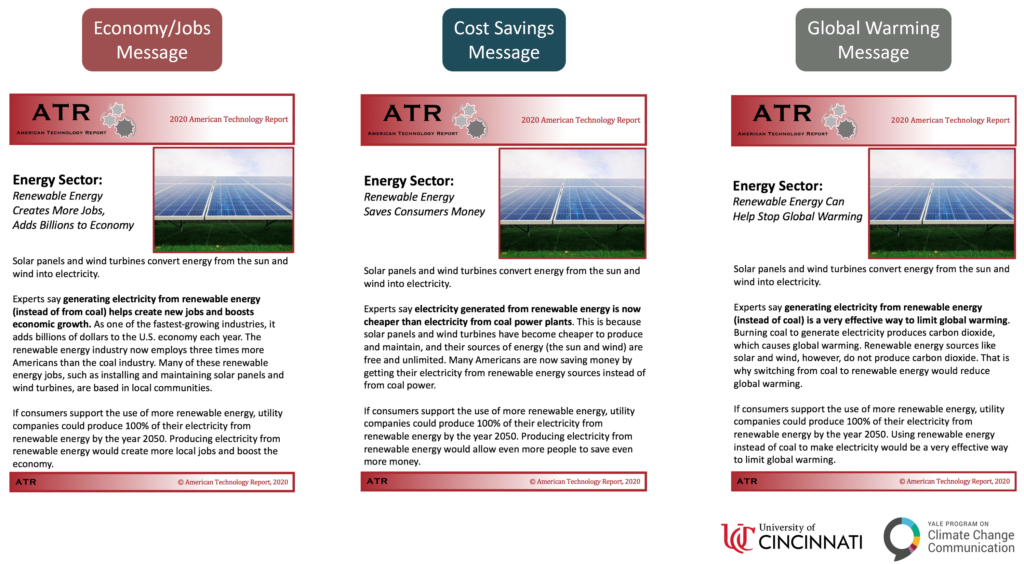Peer-Reviewed Article · Sep 13, 2022
The durable, bipartisan effects of emphasizing the cost savings of renewable energy
By Abel Gustafson, Matthew Goldberg, Parrish Bergquist, Karine Lacroix, Seth Rosenthal and Anthony Leiserowitz
Filed under: Audiences, Beliefs & Attitudes, Messaging and Policy & Politics

We are pleased to announce the publication of a new article, “The durable, bipartisan effects of emphasizing the cost savings of renewable energy” in Nature Energy. In this study, we tested different renewable energy messages to assess their effects on public beliefs about the benefits of renewable energy and support for renewable energy policies, and how long those effects lasted over time.
Effective communication about renewable energy is important for building consumer demand for clean electricity and bipartisan support for renewable energy policies. In messaging, one could emphasize environmental or economic benefits, such as renewable energy as a means to reduce global warming, the fact that it is now often cheaper than electricity produced by burning coal, or the new jobs that will be created by the renewable energy industry.
The effects of these three message frames may also differ across different audiences. For example, some people (e.g., Democrats) may respond better to a message about global warming while others may respond better to a message about cost savings (Republicans).
Another critical question is the durability of message effects. Messages can often be persuasive in the moment, but do these effects last over time? Most research has measured the effects immediately after people view a message. However, we know relatively little about whether or how these message effects persist or disappear in the days or weeks afterwards.
Our study investigated how three different messages about the benefits of renewable energy (global warming mitigation, cost savings, economy and job growth) affect public beliefs about the benefits of renewable energy and support for renewable energy policies. We measured the message effects immediately after people viewed the message and then the durability of these effects over three weeks. We also compared the message effects among Republicans and Democrats.
We found that the cost savings frame – that renewable energy can reduce electricity costs – was the most effective message in shifting public beliefs about the benefits of renewable energy. The cost savings frame was also the most effective message among both Republicans and Democrats, in both its immediate effect and the durability of the effect over time.
We also found that all three messages exhibited a similar pattern of decay in their effects over time. Specifically, the size of these effects dropped sharply (typically by about 50%) in the first 10 days after viewing the message, but then leveled off with minimal further decay over the following 10 days. This is encouraging, because it indicates that part of these message effects are durable over time and do not disappear, even after a few weeks.
Our study also investigated the effects of these messages on support for renewable energy policies. We found that the cost savings frame had a small, statistically significant effect on policy support among both Democrats and Republicans, and the economy frame had a small, statistically significant effect on policy support among Republicans. However, the global warming frame did not affect policy support among either political group.
The full article is available here to those with a subscription to Nature Energy. If you would like to request a copy, please send an email to climatechange@yale.edu with the subject line: Request Renewable Energy Framing paper. A pre-publication version is also available here.

